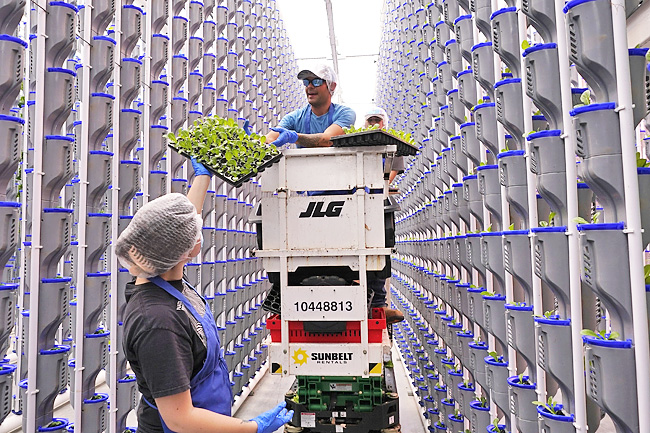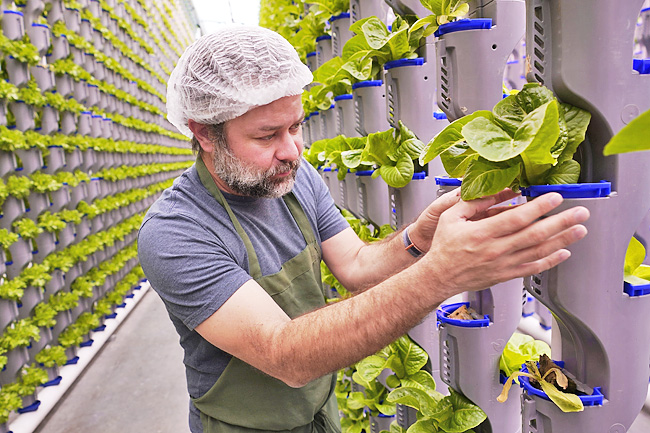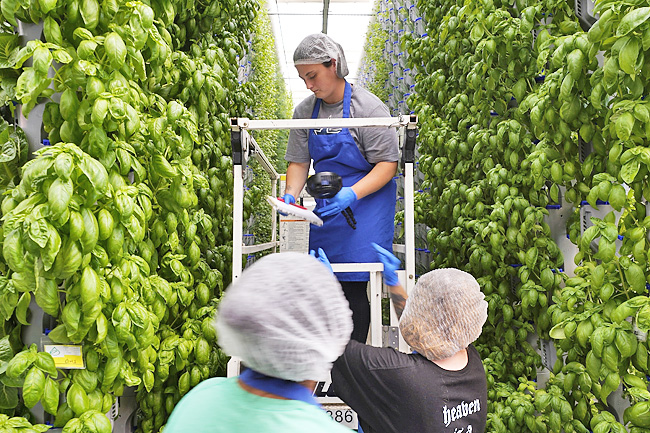AP – Inside a bright greenhouse about an hour outside Dallas, workers in hairnets and gloves place plugs of lettuce and other greens into small plastic containers – hundreds of thousands of them – that stack up to the ceiling.
A few weeks later, once the vegetables grow to full size, they’ll be picked, packaged and shipped out to local shelves within 48 hours.
This is Eden Green Technology, one of the latest crop of indoor farming companies seeking their fortunes with green factories meant to pump out harvests of fresh produce all year long.
The company operates two greenhouses and has broken ground on two more at its Cleburne campus, where the indoor facilities are meant to shelter their portion of the food supply from climate change while using less water and land.
But that’s if the concept works. And players in the industry are betting big even as rivals wobble and fail. California-based Plenty Unlimited this summer broke ground on a USD300 million facility, while Kroger announced that it will be expanding its availability of vertically farmed produce.
Meanwhile, two indoor farming companies that attracted strong startup money – New Jersey’s AeroFarms and Kentucky’s AppHarvest – filed for bankruptcy reorganisation.
And a five-year-old company in Detroit, Planted Detroit, shut its doors this summer, with the CEO citing financial problems just months after touting plans to open a second farm.



The industry churn doesn’t bother Jacob Portillo, a grower with Eden Green who directs a plant health team and monitors irrigation, nutrients and other factors related to crop needs.
“The fact that other people are failing and other people are succeeding, that’s going to happen in any industry you go to, but specifically for us, I think that especially as sustainable as we’re trying to be, the sustainable competitors I think are going to start winning,” he said.
Indoor farming brings growing inside in what experts sometimes call “controlled environment agriculture.” There are different methods; vertical farming involves stacking produce from floor to ceiling, often under artificial lights and with the plants growing in nutrient-enriched water.
Other growers are trying industrial-scale greenhouses, indoor beds of soil in massive warehouses and special robots to mechanize parts of the farming process.
Advocates say growing indoors uses less water and land and allows food to be grown closer to consumers, saving on transport. It’s also a way to protect crops from increasingly extreme weather caused by climate change.
But skeptics question the sustainability of operations that can require energy-intensive artificial light. And they say paying for that light can make profitability impossible.
Plant physiologist Tom Kimmerer, who taught at the University of Kentucky, has tracked indoor farming alongside his research into the growth of plants both outdoors and inside. He said his first thought on vertical farm startups – especially those heavily reliant on artificial light – was, “Boy, this is a dumb idea” – mainly due to high energy costs.
The industry has acknowledged those high costs. Some companies are seeking to push those down by relying on solar, which they say also supports sustainability. Even the ones most heavily reliant on artificial light that doesn’t come from renewables maintain they can be profitable by eventually producing a high volume of produce year-round.
Several of the companies say they’re on the right track. Eden Green CEO Eddy Badrina said the company has figured out a way to rely mostly on natural light for their plants. Plenty CEO Arama Kukutai said the company’s lighting system is efficient enough for the company to be profitable.
And Soli Organic CEO Matt Ryan said growing in soil indoors gives the company a better product than companies that grow in water.
But senior director Curt Covington at institutional business at AgAmerica Lending, a private investment manager and lender focused on agricultural land, isn’t convinced that indoor farming operations can work – except maybe in cases where big retailers and greenhouses team up or where grants for urban and vertical farm operations that benefit communities could be made as a form of socially conscious venture capital.









